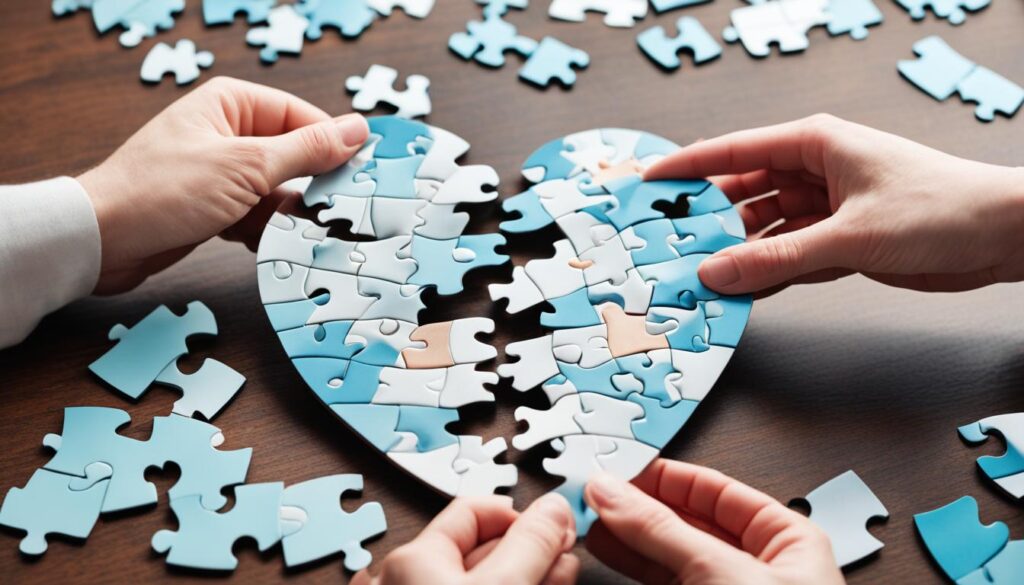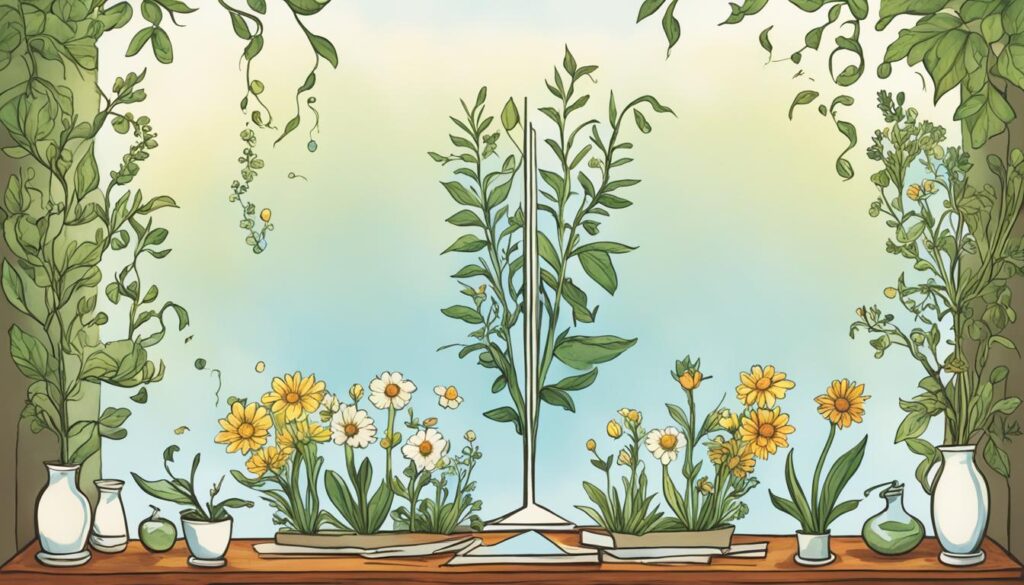“You only lose what you cling to.” – Buddha
Being hurt by someone you love can be a heartbreaking and challenging experience. When someone you love hurts you deeply, it can leave you feeling lost, confused, and in pain. But remember, healing is possible. In this article, we’ll explore 25 powerful tips to help you cope with the emotional pain, move on, and rebuild trust after being hurt by a loved one.
Key Takeaways:
- Acknowledge and process your feelings without suppressing them.
- Seek support from trusted friends, family members, or a therapist.
- Practice self-care to prioritize your emotional and mental well-being.
- Rebuild trust through open communication and consistent actions.
- Find closure by learning from the experience and cultivating gratitude.
Understanding the Impact of Buddhism on Healing from Relationship Hurt
Buddhism offers valuable insights and practices that can contribute to healing from relationship hurt. Its teachings emphasize mindfulness and compassion, which can help individuals navigate and process their emotions.
When you are hurt by someone you love, it’s natural to feel overwhelmed by intense emotions and thoughts. Buddhism teaches the practice of mindfulness, which involves staying present and focused on the present moment. By cultivating mindfulness, you can reduce the tendency to dwell on the past or worry about the future, allowing you to effectively process and heal from the pain caused by the relationship hurt.
Compassion is another fundamental aspect of Buddhism that plays a significant role in healing. By extending compassion towards yourself and others, you can foster forgiveness and emotional healing. Compassion enables you to understand the humanity in all individuals, including the one who hurt you, and encourages you to let go of resentment and seek inner peace.
Buddhism’s teachings on personal growth and societal harmony are also relevant when healing from relationship hurt. Through its emphasis on personal growth, Buddhism provides tools and practices that enable you to reflect on your experiences, learn from them, and emerge as a stronger individual. It also encourages the cultivation of societal harmony, which creates a supportive environment for healing and growth.
Overall, Buddhism offers a holistic approach to healing from relationship hurt, combining mindfulness, compassion, personal growth, and societal harmony. By integrating these principles into your healing journey, you can find solace, forgiveness, and inner peace as you navigate the path of healing.

The Importance of Acknowledging and Expressing Your Feelings
When you are hurt by someone you love, it is essential to acknowledge and express your feelings. Suppressing or ignoring your emotions will only prolong the healing process. By allowing yourself to recognize and process your emotions, you can take an important step towards healing.
One effective way to acknowledge and explore your feelings is through journaling. Take the time to reflect on your emotions and write them down in a journal. This process can help you gain clarity and insight into the impact of the hurtful experience.
Additionally, seeking support from trusted individuals is crucial. Talk to a close friend, family member, or therapist who can provide a safe space for you to express your emotions and gain a different perspective. Effective communication in these conversations will allow you to articulate your needs, concerns, and emotions in a healthy way.
Remember, emotional processing involves actively engaging with your feelings and allowing yourself to experience them fully. By acknowledging your emotions and expressing them in a constructive manner, you empower yourself to heal and move forward towards a brighter future.
The Benefits of Acknowledging and Expressing Your Feelings:
- Emotional Clarity and Insight: Acknowledging your feelings can help you gain a deeper understanding of the hurtful experience and its impact on your emotions.
- Catharsis and Release: Expressing your emotions provides an outlet for release, allowing you to let go of negative energy and find a sense of relief.
- Validation and Empowerment: Acknowledging your feelings validates your emotional experience and empowers you to take control of your healing process.
- Improved Communication: By expressing your emotions, you develop better communication skills, enabling you to articulate your needs and boundaries effectively.
- Self-Awareness and Growth: Engaging with your emotions fosters self-awareness and facilitates personal growth, leading to a stronger sense of self.
Journaling and Emotional Processing
Journaling is a powerful tool for emotional processing and self-reflection. By putting your thoughts and feelings into words, you gain a deeper understanding of your emotional landscape. Start by finding a quiet and comfortable space where you can freely express yourself. Grab a pen and a journal, and begin writing without judgment or inhibition.
Use the following prompts to guide your journaling process:
- How did the hurtful experience make me feel?
- What specific emotions am I experiencing?
- How does this emotional pain impact different areas of my life?
- What lessons can I learn from this experience?
- What steps can I take to prioritize my emotional well-being?
Remember, journaling is a personal and individualized process. Feel free to explore and adapt the prompts to suit your specific needs and emotions.
Importance of Effective Communication in Healing
In addition to journaling, effective communication plays a vital role in the healing process. By expressing your needs, concerns, and emotions to trusted individuals, you create a space for validation, understanding, and support.
When engaging in conversations about your emotions, keep the following tips in mind:
- Active Listening: Listen attentively to the other person’s perspective without judgment, allowing for open and honest dialogue.
- Use “I” Statements: Express your emotions using “I” statements to take ownership of your feelings and avoid placing blame.
- Be Respectful: Practice empathy, respect, and understanding when communicating your emotions, ensuring a healthy and productive conversation.
- Seek Professional Help: If necessary, consider reaching out to a therapist or counselor who can guide you through the healing process and provide expert support.
| Benefits of Acknowledging and Expressing Your Feelings | Journaling Prompts for Emotional Processing |
|---|---|
| Emotional Clarity and Insight | 1. How did the hurtful experience make me feel? |
| Catharsis and Release | 2. What specific emotions am I experiencing? |
| Validation and Empowerment | 3. How does this emotional pain impact different areas of my life? |
| Improved Communication | 4. What lessons can I learn from this experience? |
| Self-Awareness and Growth | 5. What steps can I take to prioritize my emotional well-being? |
Rebuilding Trust and Finding Closure in Relationships
Rebuilding trust after being hurt by someone you love is an essential part of the healing process. It requires open and honest communication, setting clear boundaries, and demonstrating consistent actions that align with your words. Trust is not something that can be rebuilt overnight; it takes time, patience, and effort from both parties involved. By actively working towards rebuilding trust, you are creating a foundation for a healthier and stronger relationship.
Open and honest communication plays a crucial role in rebuilding trust. It allows you to express your thoughts, concerns, and expectations while also providing an opportunity for the other person to do the same. By openly discussing what happened, both individuals can gain a deeper understanding of each other’s perspectives and begin to rebuild the broken trust.
Setting clear boundaries is another important aspect of rebuilding trust. Boundaries ensure that both parties understand each other’s needs, expectations, and limits. Establishing boundaries helps create a sense of safety and security in the relationship and allows for healthier communication and interactions.
Consistency is key when rebuilding trust. It is essential to back up your words with actions that align with your intentions. Consistently following through on your commitments and promises helps to gradually rebuild trust over time. It shows that you are reliable and sincere in your efforts to heal the relationship.
The process of finding closure in a relationship also contributes to healing and rebuilding trust. Open and transparent conversations about the hurt and the impact it had on both individuals are necessary to gain closure. By understanding each other’s perspectives and acknowledging the pain caused, you can begin to let go of resentment and move forward together.
Learning from the experience and using it as an opportunity for growth is an important part of the healing process. By reflecting on the situation and identifying what lessons can be learned, you can avoid repeating similar mistakes in the future. Each experience, no matter how painful, can serve as a catalyst for personal growth and positive change.
Remember, rebuilding trust and finding closure takes time, effort, and commitment from both individuals involved. It requires open communication, setting and respecting boundaries, consistent actions, and a willingness to learn and grow. By actively working towards rebuilding trust and finding closure, you can create a stronger and more resilient relationship.
The Importance of Rebuilding Trust and Finding Closure:
| Benefits of Rebuilding Trust: | Importance of Finding Closure: |
|---|---|
|
|

Practicing Self-Care and Setting Boundaries for Emotional Well-Being
When you are hurt by someone you love, it’s important to prioritize your self-care and set boundaries to protect your emotional well-being. Taking care of yourself physically, emotionally, and mentally is crucial for the healing process. Here are some practices you can incorporate:
- Get enough sleep: Rest is essential for restoring your energy and promoting emotional well-being.
- Eat well: Nourish your body with healthy and balanced meals that support your overall well-being.
- Engage in regular physical activity: Exercise is not only beneficial for your physical health but also releases endorphins, which can improve your mood and reduce stress.
- Engage in activities that bring you joy and relaxation: Whether it’s reading a book, listening to music, or taking a walk in nature, make time for activities that bring you happiness and help you destress.
Setting boundaries with the person who hurt you is essential for your emotional well-being. Clearly communicate your needs and expectations, and stick to them. Here’s how you can establish and maintain healthy boundaries:
- Identify your limits: Reflect on your values and what makes you feel comfortable or uncomfortable in a relationship.
- Communicate your boundaries: Clearly express your needs, expectations, and boundaries to the person who hurt you. Use “I” statements to avoid sounding accusatory.
- Stick to your boundaries: Be firm in upholding your boundaries and don’t let them be crossed. It’s important to protect yourself and prioritize your emotional well-being.

Practicing self-care and setting boundaries allows you to regain control over your emotions and promote healing and personal growth. Remember, taking care of yourself is not selfish but necessary for your well-being. By prioritizing self-care and establishing healthy boundaries, you can create a safe space for personal growth, self-reflection, and emotional healing.
| Benefits of Practicing Self-Care and Setting Boundaries: | How to Implement |
|---|---|
| Promotes emotional well-being | Identify and prioritize activities that bring you joy and relaxation. Clearly communicate your boundaries to the person who hurt you. |
| Enhances self-esteem and self-worth | Take care of your physical health by getting enough sleep and eating well. Stick to your boundaries and prioritize your needs. |
| Reduces stress and anxiety | Engage in regular physical activity to release endorphins and relieve stress. Establish clear boundaries to minimize triggers. |
| Fosters personal growth and self-reflection | Use self-care practices as opportunities for self-reflection and personal growth. Reflect on your needs and values to establish healthy boundaries. |
| Creates a sense of control | Setting boundaries allows you to have control over your emotions and protect yourself from further harm. Prioritize your well-being by asserting your boundaries. |
Learning from the Experience and Cultivating Gratitude
Going through relationship hurt can be a challenging and painful experience, but it also presents an opportunity for personal growth and self-reflection. By taking the time to reflect on the experience, you can identify valuable lessons that will help you become a stronger and more resilient person.
Reflecting on the experience allows you to gain insights into your own actions, feelings, and vulnerabilities. It helps you understand patterns and behaviors that may have contributed to the hurt, enabling you to make positive changes in your future relationships. Embrace the lessons learned as stepping stones towards personal growth, empowering yourself to create healthier and more fulfilling connections in the future.
Cultivating gratitude is another powerful tool for healing and moving forward. While it may be difficult to feel grateful in the midst of hurt, shifting your perspective towards gratitude can provide a new sense of hope and positivity. Focus on the things you are grateful for in your life, such as supportive friends and family, personal achievements, or simple moments of joy. Expressing gratitude can improve your mood, boost your overall well-being, and help you find peace amidst the pain.

Remember, healing takes time, and it’s important to be patient with yourself. Allow yourself space for self-reflection, personal growth, and the cultivation of gratitude. Each step forward, no matter how small, is progress. By learning from your experiences and embracing gratitude, you can navigate the healing process with strength and resilience.
Conclusion
Healing from relationship hurt is a journey that requires time, effort, and self-reflection. By implementing the tips shared in this article, you can start your healing process and move forward towards finding closure and personal growth. Remember to be patient with yourself as healing takes time, and focus on the present moment instead of dwelling on the past.
It is crucial to acknowledge and express your feelings, seeking support from trusted friends or professionals if needed. Take care of yourself by prioritizing self-care and setting boundaries to protect your emotional well-being. Through personal growth and self-reflection, you can learn from the experience and become a stronger, more resilient person.
Forgiveness is also an essential part of the healing process. Practice forgiveness towards yourself and others involved, freeing yourself from the burden of resentment. By practicing gratitude and cultivating a positive mindset, you can create a brighter future for yourself. Remember, healing is possible, and by taking these steps, you can find the closure you deserve and embark on a journey of personal growth and happiness.
FAQ
What should I do when I am hurt by someone I love?
When you are hurt by someone you love, it’s essential to acknowledge and process your feelings, talk to someone for support, practice self-care, seek professional help if needed, and practice forgiveness and letting go of the need to control the other person’s behavior. Making a plan, staying connected with others, and focusing on your own happiness are also crucial in the healing process.
How can Buddhism help in healing from relationship hurt?
Buddhism offers valuable insights and practices such as mindfulness and compassion, which can aid in navigating and processing emotions. Mindfulness allows you to stay present and focused on the present moment, reducing the tendency to dwell on the past or worry about the future. Compassion encourages understanding and empathy towards yourself and others, fostering forgiveness and emotional healing. Buddhism also provides teachings that promote personal and societal harmony, creating a supportive environment for healing and growth.
Why is it important to acknowledge and express your feelings when you are hurt by someone you love?
Acknowledging and expressing your feelings is crucial when you are hurt by someone you love. Suppressing or ignoring your emotions will only prolong the healing process. Take the time to reflect on your feelings and write them down in a journal if it helps you gain clarity and insight. Effective communication, including talking to a trusted friend, family member, or therapist, can also provide an outlet for processing your emotions and gaining a different perspective.
How can I rebuild trust and find closure in relationships after being hurt?
Rebuilding trust after being hurt by someone you love requires open and honest communication, setting clear boundaries, and demonstrating consistent actions that align with your words. Trust is something that needs to be earned over time, and both parties must be willing to work towards rebuilding it. Finding closure involves having open conversations about the hurt, understanding each other’s perspectives, and making a conscious effort to move forward while learning from the experience.
How can practicing self-care and setting boundaries help in healing from relationship hurt?
Practicing self-care is crucial when you are hurt by someone you love. Take the time to prioritize your physical, emotional, and mental well-being. Get enough sleep, eat well, engage in regular physical activity, and participate in activities that bring you joy and relaxation. Setting boundaries with the person who hurt you is also essential for your emotional well-being. Clearly communicate your needs and expectations, and stick to them. Setting boundaries allows you to protect yourself and maintain a sense of control over the situation, promoting healing and personal growth.
How can I learn from the experience and cultivate gratitude in the healing process?
Going through relationship hurt provides an opportunity for personal growth and learning. Reflect on the experience and identify the lessons you’ve learned. Use these lessons to become a stronger, more resilient person. Cultivating gratitude can also be helpful in the healing process. Focus on the things you are grateful for and shift your perspective to the positive aspects of your life. Expressing gratitude can improve your mood and help you move forward with a more positive mindset.
How can I heal from relationship hurt and find closure?
Healing from relationship hurt is a process that takes time and effort. By following the tips mentioned in this article, such as acknowledging your feelings, seeking support, practicing self-care, and setting boundaries, you can begin to heal and move forward. Remember to be patient with yourself and focus on the present moment. Learn from the experience, cultivate gratitude, and practice forgiveness. Healing is possible, and through personal growth and self-reflection, you can find closure and create a brighter future for yourself.

